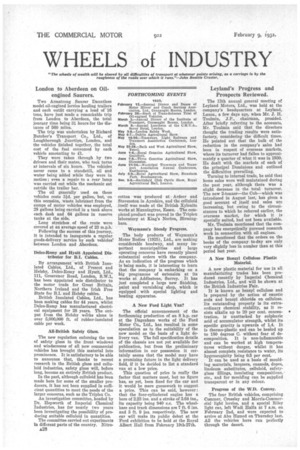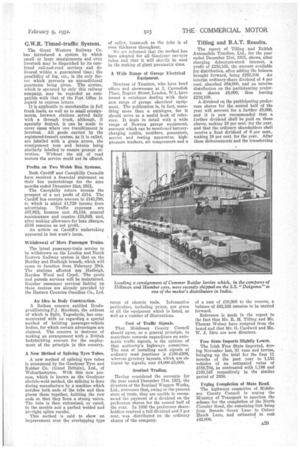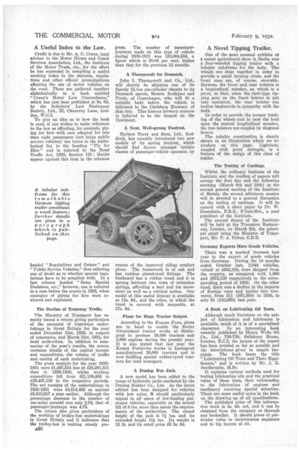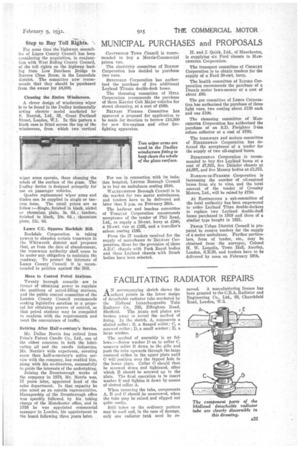WHEELS of INDUSTRY
Page 30

Page 31

Page 32

Page 33

If you've noticed an error in this article please click here to report it so we can fix it.
"The wheels of wealth will be slowed by all difficulties of transport at whatever points arising, as a carriage is by the roughness of the roads over which it runs."—John Beattie Crozier.
London to Aberdeen on Oil engined Saurers.
Two Armstrong Saurer Dauntless model oil-engined lorries hauling trailers and each outfit carrying a load of-16 tons, have just made a remarkable trip from London to Aberdeen' the total journey time being 31 hours for the distance of 560 miles.
The trip was undertaken by Richard Butcher's Transport Co., Ltd., of Loughborough Junction, London, and the vehicles finished together, the total cost of the fuel consumed by each vehicle amounting to £1.
They were taken through by two drivers and their, mates, who took turns at intervals of six hours. The vehicles never came to a standstill,oil and water being added while they were in motion ; even a repair to a rear lamp was carried out while the mechanic sat astride the trailer bar.
The oil generally used on these vehicles costs 3id. per gallon, but, on this occasion, waste lubricant from the sumps of motor vehicles was employed, 28 gallons being carried in a tank above each dash and 64 gallons in reserve tanks at the aide.
, Long stretches. of the route were covered at an average speed of 23 m.p.h. Following the success of this journey,. it is intended to inaugurate a regular goods-delivery service by such vehicles between London and Aberdeen.
Delco-Remy and Hyatt Appointed Distributor for B.T. Cables.
By arrangement with British Insulated Cables, Ltd., of Prescot and ilelsby, Deka-Remy and Hyatt, Ltd., 111, Grosvenor Road, London, S.W.1, has been appointed sole distributor to the motor trade , for Great Britain, Northern Ireland and the Irish Free State for Bd. and Helsby cables.
British Insulated Cables, Ltd., has been making cables for 44 years, whilst Delco-Remy has manufactured electrical equipment for 28 years. The output from the Helsby w67rks alone is over 5,000,000 ft. of rubber-insulated cable per week.
All-British Safety Glass.
The new regulation enforcing the use of safety glass in the front windows and windscreens of all new commercial vehicles has brought this material into prominence. It is satisfactory to be able to announce that, thanks to recent research in the British glass and celluloid industries, safety glass will, before long, become an entirely British product.
Ii the past, although celluloid has been made here for some of the smaller producers, it has not been supplied in sufficient quantities to meet the needs of the larger concerns, such as the Triplex Co.
An investigation committee, headed by Dr. Hepworth of Imperial Chemical Industries, has for nearly two years been investigating the possibility of producing suitable celluloid in quantities.
The committee carried out experiments In different parts of the country. Nitro .8.28
cotton was produced at Ardeer and Stevenston in Ayrshire, and the celluloid itself was made at the British Xylonite works at Manningtree, Essex. The completed product was proved in the Triplex laboratory at King's Norton, Birmingham.
Werraann's Steady Progress.
The body products of Weymann's Motor Bodies (1925), Ltd., are making considerable headway, and many important municipalities and large operating concerns have recently placed substantial orders with the company. As an indication of the progress which is being made, it is interesting to learn that the company is embarking on a big programme of extension at its works at Addlestone, Surrey. It has just completed a large new finishing, paint and varnishing shop, which is equipped with special lighting and heating apparatus.
A New Ford Light. Van?
The official announcement of the forthcoming production of an 8 h.p. car at the Dagenharn works of the Ford Motor Co., Ltd., has, resulted in some speculation as to the suitability of the new model as the basis of a light delivery van. The full specification details of the chassis are not yet available for publication, but from the preliminary information in our possession it certainly seems that the model may have a promising future in the light delivery field, if it be decided to list a standard van at a low price.
This question of price is really the factor that matters most, but no figure has, as yet, been fixed for the car and it would be mere guesswork to suggest a price. This can be said, however : that the four-cylindered engine has a bore of 2.23 ins, and a stroke of 3.64 ins., its capacity being 940 c.c. The wheelbase and track dimensions are 7 ft. 6 ins. and 3 ft. 9 ins. respectively. The new ear will make its public debut at the Ford exhibition to be held at the Royal Albert Hall from February 19th-27th.
Leyland's Progress and Prospects Reviewed.
The 13th annual general meeting of Leyland Motors, Ltd., was held at the company's headquarters at Leyland, Lancs., a few days ago, when Mr. J. H. Toulmin, J.P., chairman, presided. After briefly referring to the accounts, Mr. Toulmin said that the directors thought the trading results were satisfactory, considering the difficult times. He pointed out that the bulk of the reduction in the company's sales had been in respect of overseas markets, where its turnover had fallen to approximately a quarter of what it was in 1930. He dealt with the markets of each of the principal Dominions and outlined the difficulties prevailing.
Turning to internal trade, he said that home sales were well maintained during the past year, although there was a slight decrease in the total turnover. The new 2-tonner—the Cub—which was introduced in August last, has given a good account of itself and sales are increasing, but owing to the circumstances to which he referred earlier, the overseas market, for which it is specially suited, had not been available.
Mr. Toulmin mentioned that the company has energetically pursued research work in connection with oil engines.
He mentioned that the orders on the books of the company to-day are only very slightly less in number than at this period last year.
A New Benzyl Cellulose Plastic Material.
A new plastic material for use in all manufacturing trades has been produced recently by Imperial Chemical Industries, Ltd., and will be shown at the British Industries Fair.
It is known as benzyl cellulose and is prepared by the action of caustic soda and benzyl chloride on cellulose. Its outstanding property is its extraordinary chemical stability, as it resists alkalis up to 20 per cent. concentration, is unattacked by sulphuric acid of accumulator strength, whilst its specific gravity is upwards of 1.4. It is thermo-plastic and can be healed up to 180 degrees C. without fear of decomposition. It is non-inflammable and can be worked at high temperatures without danger, whilst it has almost complete resistance to water, its hygroscopicity being 0.5 per cent.
It can be used as a basis Of moulding materials, lacquers, enamels, dopes, linoleum substitutes, celluloid, safetyglass fillings, insulating compositions, etc., and for moulding can be supplied transparent or in any colour.
Progress of the W.D. Convoy.
The four British vehicles, comprising Commer, Crossley and Morris-Commercial light lorries, and a special Riley light car, left Wadi Haifa at 7 a.m. on February 2nd, and were expected to arrive at Abu Hamed on Thursday last. All the vehicles have run perfectly through the desert.
G.W.R. Timed-traffic System.
The Great Western Railway Co. has introduced a system by which small or large consignments and even livestock may be dispatched by its combined rail-and-road services and delivered within a guaranteed time ; the possibility of fog, etc., is the only factor which prevents an unconditional guarantee being given. The system, which is operated by only this railway company, may be regarded as compatible with that of the Post Office in regard to express letters.
It is applicable to merchandise in full truck loads, as well as to small consignments, between stations served daily with a through truck, although, if specially desired, it can be made to cover cases where one transhipment is involved. All goods carried by the registered-transit system, as it is called, are labelled with a green arrow, the consignment note and invoice being similarly labelled to ensure prompt attention. Without the aid of road motors the service could not be offered.
Profits on Two Welsh Bus Systems.
Both Cardiff and Caerphilly Councils have received a financial statement on their bus undertakings for the nine months ended December 31st, 1931.
The Caerphilly return reveals the prospect of a net profit of £214. The Cardiff bus receipts amount to £143,798, to which is added £1,729 income from advertising. Traffic expenses are £67,913, licences cost £6,134, general maintenance and repairs £18,649, and, after making allowance for loan charges, £816 remains as net profit.
An article on Cardiff's undertaking appeared in last week's issue.
Withdrawal of' More Passenger Trains.
The latest passenger-train service to be withdrawn on the London and North Eastern Railway system is that on the Bentley and Hadleigh branch, which will cease to function from February 29th. The stations affected are Hadleigh, Raydon Wood and Capel. The goods and parcels services will be maintained. Regular passenger set-vices linking up these centres are already provided by the Eastern Counties Omnibus Co., Ltd.
An Idea in Body Construction.
A Balkan concern entitled Brodogradilisteing.P.J. Mardesic, the address of which is Split, Yugoslavia, has communicatid with us regarding a special method of building passenger-vehicle bodies, for which certain advantages are claimed. The concern is desirous of making an arrangement with a British bodybuilding concern for the employment of the principle in this country.
A New Method of Splicing Tyre Tubes.
A new method of splicing tyre tubes is announced by the Goodyear Tyre and Rubber Co. (Great Britain), Ltd., of Wolverhampton. With this new process, which is known as the Goodyear electric-weld method, the splicing is done during manufacture by a machine which notches both ends of the tube and then places these together, knitting the raw ends so that they form a strong union. The tube is then vulcanized, or cured, in the moulds and a perfect welded and air-tight splice results, This method is said to show an improvement over the overlapping type of splice, inasmuch as the tube is of even thickness throughoirt.
We are informed that the method has been adopted for all Goodyear car-tyre tubes and that it will shortly be used in the making of giant pneumatic sizes.
A Wide Range of Garage Electrical Equipment.
Newtons of Taunton, who have head offices and showrooms at 3, Cavendish Place, Regent Street, London, W.1, have issued a catalogue dealing with their new range of garage electrical equipment. The publication is, in fact, something more than a catalogue, for it should serve as a useful book of reference. It deals in detail with a wide range of Newton garage equipment, amongst which can be mentioned batterycharging outfits, rectifiers, generators, service and testing apparatus, highpressure washers, air compressors and a range of electric tools. Informative particulars, including prices, are given of all the equipment which is listed, as well as a number of illustrations.
Cost of Traffic Signals.
That Middlesex County Council should agree, as a general principle, to contribute towards expenditure on automatic traffic signals, is the opinion of that authority's highways committee. The cost of installing such signals at ordinary road junctions is i150-£200, whereas gyratory layouts, which are obviated by signals, cost £4,000-£5,000.
Sentinel Trading.
Raving considered the accounts for the year ended December 81st, 1931, the directors of the Sentinel Waggon Works, Ltd., announce that, owing to the present state of trade, they are unable to recommend the payment of a dividend on the preference shares for the second half of the year. In 1930 the preference shareholders received a full dividend and 3 per cent. was distributed on the ordinary shares of the company.
Tilling and B.A.T. Results.
The report of Tilling and British Automobile Traction, Ltd., for the year ended December 31st, 1931, shows, after charging debenture-stock interest, a profit of 1230,105, the amount available for distribution after adding the balance brought forward, being £282,108. An interim ordinary-share dividend of 4 per cent. absorbed £64,000, and an interim distribution on the participating preference shares £8,000, thus leaving £210,108, A dividend on the participating preference shares for the second half of the year will account for a further £8,000, and it is now recommended that a further dividend shall be paid on those shares, making 10 per cent. for the year, and that the ordinary shareholders shall receive a final dividend of 6 per cent., making 10 per cent, for the year. After these disbursements and the transferring of a sum of £10,000 to the reserve, a balance of £92,108 remains to be carried forward.
Reference is made in the report to the fact that Mr. It. M. Tilling and Mr. Thomas Wolsey have resigned from the board and that Mr. G. Cardwell and Mr. W. J. lden are now directors.
Free State Imports Slightly Lower.
The Irish Free State imported, during November last, 81 vans and lorries, bringing up the total for the first 11 months of the past year to 1,153 vehicles of an estimated value of £188,704, as contrasted with 1,186 and £191,347 respectively in the similar period of 1930.
Urging Completion of Main Road.
The highways committee of Middlesex County Council is urging the Ministry of Transport to sanction the scheme for the, completion of the North Circular Road, the remaining link being from Bounds Green Lane to Colney Hatch Lane, and estimated to cost £42,000.
A Useful Index to the Law.
Credit is due to Mr. A, C. Crane, legal adviser to the Motor Hirers and Coach Services Association, Ltd., the Institute of the Motor Trade, etc., for the effort he has expended in compiling a useful working index to the statutes, regulations and other official promulgations affecting the use of motor vehicles on the road. These are gathered together alphabetically in a book entitled "Crane's Motor Law Concordance," which has just been published at 9s. 6d.. by the Solicitors' Law Stationery Society, Ltd., 22, Chancery Lane, London, W.C.2.
To give an idea as to how the book is used, if one wishes to make reference to the law as affecting, for example, plying for hire with cars adapted for less . than eight passengers (not being public service vehicles) one turns in the alphabetical list to the heading "Ply for Hire" and is referred to the Road Traffic Act, 1930, Section 121 ; blanks appear against this item in the columns headed "Regulations and Orders" and "Public Service Vehicles," thus relieving one of doubt as to whether special regulations have to be complied with. In a last column headed "Some Special Decisions, etc.," however, one is referred to a case before the courts in 1928, when examples of plying for hire were reviewed and explained.
The Decline of Tramway Traffic.
The Ministry of Transport has recently issued a return giving particulars of the accounts of tramways undertakings in Great Britain for the year ended December 31st, 1930, in respect of companies, and March 31st, 1931, for local authorities. In addition to summaries of the year's results, the return contains details of the capital income and expenditure, the volume of traffic and results of each undertaking.
The gross receipts for the year 1930
• 1931 were £1,487,554 less at £25,281,531 than in 1929-1930, whilst working expenditure fell from £21,156,468 to £20,467,129 in the respective periods. The net receipts of the undertakings in 1930-1931 were £4,814,402 as against £5,612,617 a year earlier. Although the percentage decrease in the number of car-miles covered was only 2.76, that of passenger-journeys was 4.75.
The return also gives particulars of the working of trolley-bus undertakings • in Great Britain and it indicates that the trolley-bus is making steady pro.&80
gress. The number of passengerjourneys made on this type of vehicle during 1930-1931 was 153,004,554, a figure which is 20.04 per cent. higher than that for the previous 12 months.
A Thornycroft for Denmark.
John I. Thornycroft and Co., Ltd., 'will shortly be shipping one of its Speedy 21-ton six-cylinder chassis to its Denmark agents, Messrs. Rodkjaer and Tvede, of Copenhagen, who will fit a suitable body before the vehicle is delivered to the Carlsberg Brewery, of that city. This famous brewery concern is believed to be the largest on the Continent.
A Neat, Well-sprung Footrest.
Herbert Terry and Sons, Ltd., Redditch, has recently introduced two new models of its spring footrest,. which should find favour amongst certain classes of passenger-vehicle operator, by reason of the improved riding comfort given. The framework is of oak and has rustless plated-steel fittings. The footboard has a rubber tread and it is sprung between two rows of extension springs, affording a heel and toe movement as well as a vertical action. One model of this useful fitment is available at 12s. 6d., and the other, in which the tread is covered with moquette, at 17s. 6d.
Plans for Huge Tractor Output.
According to the Moscow News, plans are in hand to enable the Soviet Government tractor works at Stalingrad to produce 39,500 tractors and 2,000 engines during the present year. It is also stated that last year the Krasni Putilovitz works in Leningrad manufactured 20,000 tractors and is now building special rubber-tyred tractors for road transport.
A Dunlop Bus Jack.
A new model has been added to the range of hydraulic jacks marketed by the Dunlop Rubber Co., Ltd. As the latest edition has been designed for vehicles with low axles, It should particularly appeal to all users of low-loading passenger vehicles, especially as the actual lift of 8 ins, more than meets the requirements of the authorities. The closed height of the jack is 71 ins, and its extended height 18/ ins, Its weight is 33 lb. and its retail price 15 3s. 6d.
A Novel Tipping Trailer.
. One of the most unusual exhibits at a recent agricultural show in Berlin was a four-wheeled tipping trailer with a tubular sub-frame for the body. The wheels are close together in order to provide a small turning circle, and the front ones are, of course, steerable. Between the front and rear bolsters is a longitudinal member, on which is a pivot, so that, when the rack-type tipping gear on the front bolster is put into operation, the rear bolster can incline backwards in sympathy with the body.
In order to provide the 'proper tracking of the wheels and to ease the load upon the central longitudinal member, tlt two bolsters are coupled by diagonal braces.
The tubular construction is clearly shown in an illustration which we reproduce on this page. Lightness, coupled with great strength, is a feature of the design of this class of trailer.
The Testing of Castings.
Whilst the ordinary business of the Institute and the reading of papers will occupy the first day and the following morning (March 9th and 10th) at the annual general meeting of the Institute of Metals, the second afternoon session will be devoted to a general discussion on the testing of castings. It will be opened with a short paper by Dr. W. Rosenhain, FRS., F.Inst.Met., a past president of the Institute.
The annual dinner of the Institute will be held at the Trocadero Restaurant, London, on March 9th, the principal guest being the Minister of Transport, Mr. P. J. Pybus, C.B.E.
Germany Exports More Goods Vehicles.
There was a marked increase last year in the export of goods vehicles from Germany. During the 10 months ended October last, 2,848 vehicles, valued at £932,100, were shipped from the country, as compared with 1,660 and £672,100 respectively in the correspondin4 period of 1930. On the other hand, there was a decline in the imports of foreign vans and lorries into Germany, from 311 (£91,350) in 1930, to only 91 (±42,650) last year.
A Book on Lubricating Oil Tests.
Although much literature on the subject of lubrication and lubricants is available, much of it is of a specialized character. In an interesting book recently published by Henry Wells Oil Co., Ltd., 736-739, Salisbury House, London, E.C.2, the jargon of the expert has been avoided so far as possible and the descriptions given in simple language. The book bears the title "Lubricating Oil Tests and Their Significance," and is written by Mr. J. E. Southcombe, M.Sc.
It explains various methods used for testing lubricating oils and the practical value of these tests, their relationship to the lubrication of engines and machinery receiving special attention. There are some useful notes in the book on the drawing up of oil specifications.
The published price of this informative work is 2s. 6d. net, and it can be obtained from the company or through any bookseller. It should prove of particular value to maintenance engineers and to big buyers of oil. Step to Buy Toll Right's.
For some time the highways committee of Lanes County Council has been considering the acquisition, in conjunction with West Riding County Council, of the toll rights on the highway leading from Low Bentham Bridge to Ravens Close Brow, in the Lunesdale district. The committee now recommends that they should be purchased from the owner for £4,000.
Cleaning the Entire Windscreen.
A clever design of windscreen wiper is to be found in the Dudley horizontally acting electric model marketed by S. Norrish, Ltd., 59, Great Portland Street, London, W.1. In this pattern a black case is fitted across the top of the windscreen, from which two vertical wiper arms operate, these cleaning the whole of the surface of the glass. The Dudley device is designed primarily for use on passenger vehicles.
Quadro replacement wiper arms and blades can be supplied in single or tandem form. The retail, prices are as follow :—Single, finished in black, nickel or chromium plate, 3s. 6d.; tandem, finished in black, 10s. 6d.; chromium Plate, 12s. 6d.
Lanes C:C. Opposes Rochdale Bill.
Rochdale Corporation is taking powers to abandon certain tramways in the Whitworth district and proposes that, as from the date of abandonment, the tramways authority shall cease to be under any obligation to maintain the roadway. To protect the interests of Lanes County Council it is recommended to petition against the Bill.
Move to Control Petrol Stations.
Twenty borough councils are in favour of obtaining power to regulate the positions of petrol-filling stations, and the public control committee of the London County Council recommends seeking legislative sanction to a proposal for obtaining powers of control, so that petrol stations may be compelled to conform with the requirements and meet the convenience of traffic.
Retiring After Half-a-century's Service.
Mr. Dallas Norris has retired from Price's Patent Candle Co., Ltd., one of the oldest concerns in both the lubricating oil and the candle industries. Mr. Norris's wide experience, covering more than half-a-century's active service with the company, has enabled him, along with his co-directors, successfully to guide the interests of the undertaking.
Joining the Bromborough works of the company in 1879, Mr. Norris was, 17 years later, appointed head of the sales department. In that capacity he also acted as an outside representative. Managership of the Bromborough office was speedily followed by his taking charge of the Manchester office, and in 1916 he was appointed commercial manager in London, his appointment to the board following three years later.




























































































